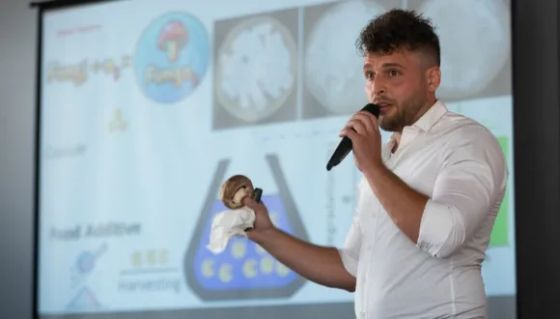Growing mushrooms from plastic waste, overturning wrongful convictions, building next-gen microscopes, and training a brain-aware chatbot—these are just some of the breakthrough solutions presented at the Falling Walls Lab Tel Aviv competition hosted by Tel Aviv University on July 11.
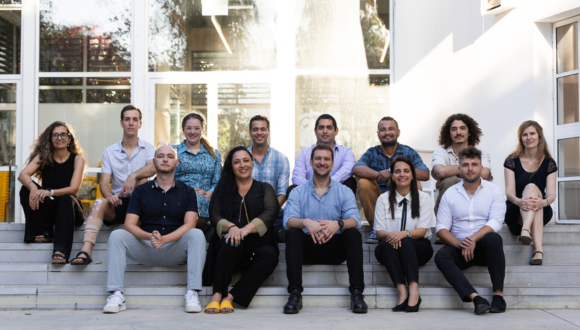
Falling Walls Lab participants with Michael Linder Zarankin, the Lowy International School (left) and Anne Gladitz, DAAD (right)
The event, organized by the Lowy International School in collaboration with the German Academic Exchange Service (DAAD), is part of an international series of pitch competitions where participants present their solutions to the world’s most pressing challenges in just three minutes. The winners advance to the global finals in Berlin on November 7, where they will compete for the Breakthrough Winner title in the Emerging Talents category and get to attend the Falling Walls Science Summit to engage with leading figures in science, business, and policy.
Pioneering Minds at Work: Pitch Highlights
Carefully selected participants from various Israeli universities pitched their innovative ideas in fields ranging from cancer research and superconductors to neuroscience, linguistics, and law. The jury, comprised of experts from Tel Aviv University, the Weizmann Institute of Science, Reichman University, and the University of Haifa, evaluated the pitches based on innovation, relevance and potential impact, and presentation performance.
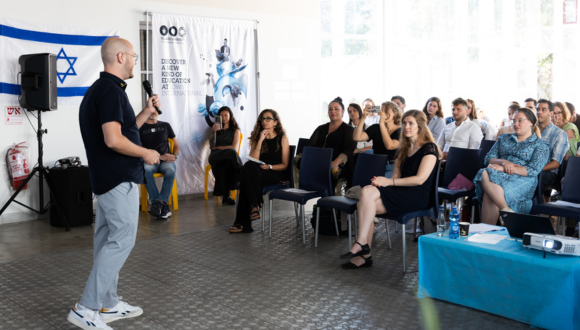
Netanel Loyfer from The Hebrew University of Jerusalem won the competition with his groundbreaking project on cell-free DNA. Loyfer’s innovation involves tracking cell-free DNA fragments in the bloodstream to detect early signs of various diseases.
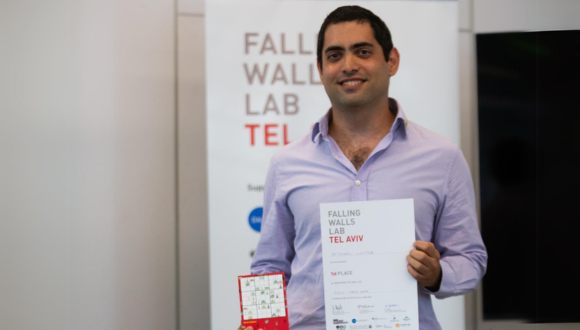
Netanel Loyfer (The Hebrew University of Jerusalem), the Falling Walls Lab winner
By identifying the signatures of different cell types, his method allows for precision diagnosis using a simple blood test, offering a promising tool for early detection of dangerous diseases. A cancer screening test using this technology is already commercially available in Israel and worldwide.
“We are not the only ones to detect mutations, but we are the only ones who can differentiate the affected organs. Our technology saves lives.”—Netanel Loyfer, the competition winner
Barak Halpern from Tel Aviv University secured second place with his project focusing on sustainable agriculture. He proposed using fungi to convert agricultural waste, including plastic, into useful products, and even growing mushrooms. To demonstrate the viability of the project, Halpern even took a bite of a mushroom!
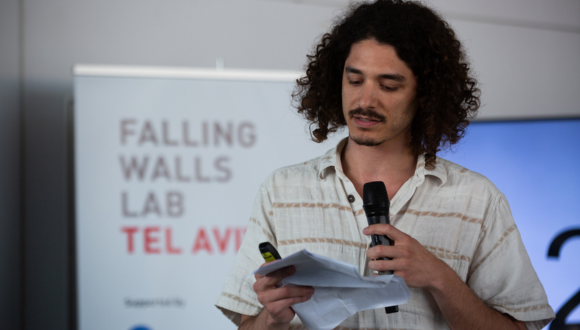
Gony Rosenman from Tel Aviv University
Third place went to Gony Rosenman from Tel Aviv University for his work on mental health diagnostics. Rosenman’s project integrates fMRI technology with advanced AI to improve the accuracy of psychiatric assessments, aiming to revolutionize mental health care with personalized, data-driven solutions.
“We are talking about a new era with brain-aware chatbots that operate on text alone but retain neuroscientific insight, making the approach practical and cost-effective”—Gony Rosenman
Other notable projects included Rachel Thau-Bedziner’s Validify, which aims to combat disinformation using AI and machine learning, already boasting a 70% accuracy rate in real-time verification. Liron Amihai from Tel Aviv University showcased a computer vision-based platform that helps children with autism practice facial mimicry skills
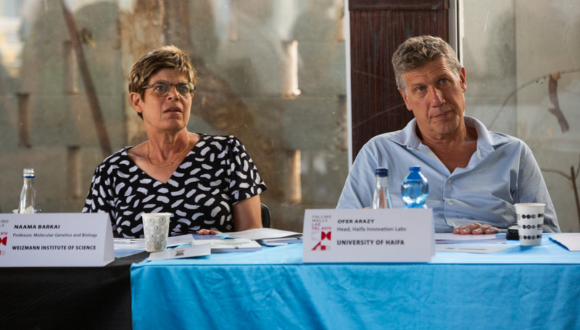
The jury members (from left to right): Naama Barkai, Weizmann Institute of Science, Ofer Arazy, University of Haifa
Nir Cafri from Tel Aviv University showed an intelligent sleep mask designed to improve sleep quality. Ralfy Kenaz from the Hebrew University of Jerusalem presented Relips, a tool enhancing semiconductor manufacturing. Asaf Cohen from Tel Aviv University introduced an AI-based real-time CPR coach to improve the quality and timeliness of CPR administered outside hospital settings.
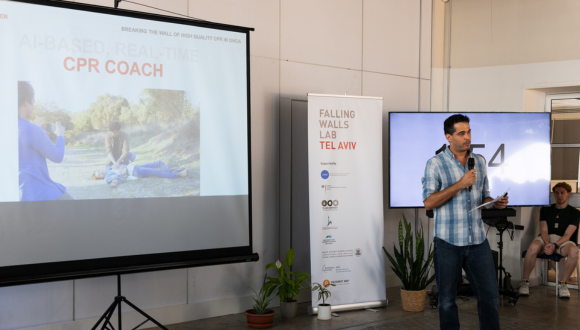
Asaf Cohen (Tel Aviv University) presenting the CPR coach
Hadar Abutbul-Oz of Bar Ilan University showcased MultiPath, a digital platform providing language profiles of children to address language gaps early. Mayur Tanna from The Hebrew University of Jerusalem presented a novel approach to inhibit cancer metastasis by studying the chemical processes of migrating cancer cells.

Liora Cohen, University of Haifa, Falling Walls Lab participant
Liora Cohen from the University of Haifa highlighted a project aimed at preventing wrongful convictions through better media literacy and strategic use of communication in legal defenses.
Breaking Walls Between Countries
This is the second year that the Falling Walls Lab has been held at Tel Aviv University. Prof. Milette Shamir, VP of International at TAU, stressed the event’s importance in the current climate of political instability and polarization, especially considering the academic boycotts Israeli universities have faced since October 7.

Falling Walls Lab jury (from left to right): Ofer Arazy (University of Haifa), Milette Shamir (Tel Aviv University), Yair Sakov (Tel Aviv University)
Shamir emphasized that by “recognizing and supporting the innovative minds of young people around the world, Falling Walls inspires hope for overcoming the complex problems that we face today. If there is hope for all of us in this region and globally, it lies in the creative spirit of this new generation of thinkers and doers.”
“The spirit of collaboration across national borders and the commitment to the free exchange of ideas are the underlying principles of the Falling Walls Lab, as even its title implies, the walls that fall down.”—Prof. Milette Shamir
Marco Mattheis, the Cultural Attaché of the Embassy of Germany in Israel, echoed this spirit: “Academic exchange between our countries lies at the heart of Israeli-German exchange in general.”
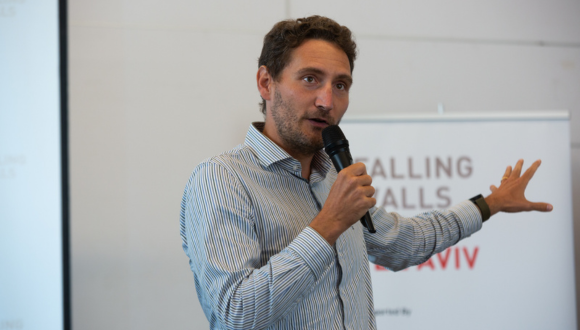
Marco Mattheis, Cultural Attaché of the Embassy of Germany in Tel Aviv
We will do everything we can to stop the boycott movement because trying to silence all those whose opinion you might not like, or even all voices from an entire country, no matter what their scientific or political opinion is not acceptable.”—Marco Mattheis, Cultural Attaché of the Embassy of Germany in Tel Aviv
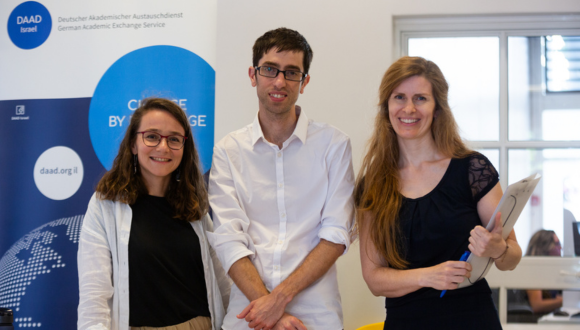
Anne Gladitz (right) with representatives of the German Academic Exchange Service (DAAD)
Anne Gladitz from the German Academic Exchange Service remarked, “Events like the Falling Walls Lab create hope by insisting on a common world. The presentations give us a glimpse of what a better world could look like.”
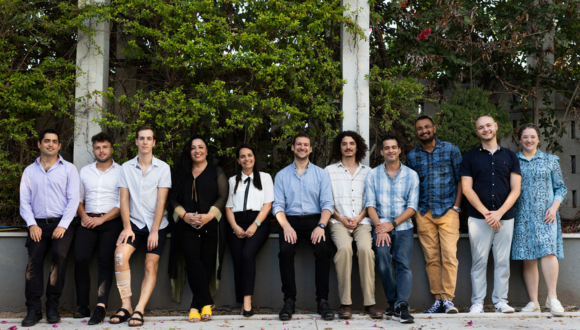
Competition participants
The Falling Walls Lab Tel Aviv competition not only highlighted the incredible talent and innovative spirit of early career researchers from various Israeli universities but also underscored the importance of international collaboration. The event serves as a reminder that the future of science and technology depends on fostering creativity, supporting young innovators, and breaking down barriers—both physical and intellectual.

